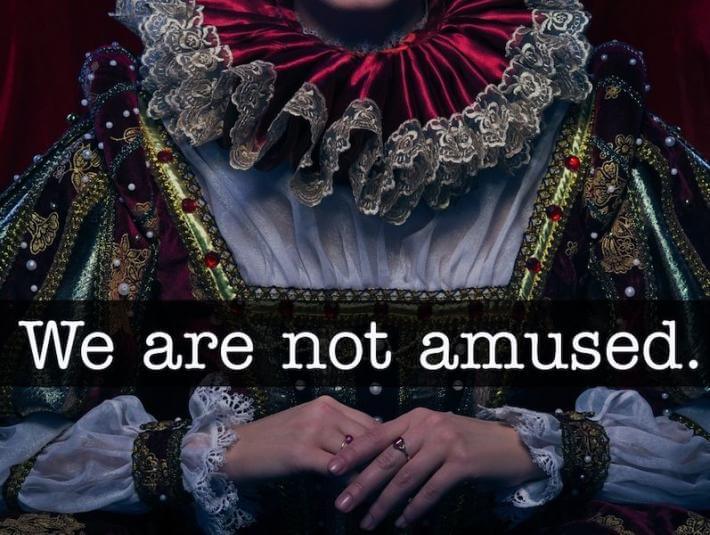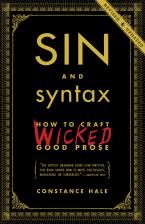The Royal “We”
In honor of royal babies, we’re pondering a pompous pronoun choice known as the “royal we.” Constance Hale is a San Francisco journalist who covers grammar, writing, and the writing life at www.sinandsyntax.com.
Constance Hale, Writing for

Listen
The Royal “We”
The pronouns a writer chooses may seem like a wee little thing, but these little stand-ins for nouns can have an outsize impact, setting the point of view of a passage as well as its tone, and making some pretty grand (or grandiose) statements. Take, for example, the use of the first person plural pronoun by a speaker who means I but says we. .
The Royal We
The most sanctioned example of this is “the royal we,” or pluralis majestatis. Don’t be fooled by the Latin: the royal we has enjoyed popularity far beyond Rome by monarchs, popes, and even university rectors. The origin of this pronoun has been traced variously to 1169, when the English king Henry II used it to mean “God and I,” and to King Richard I, whose use of the pronoun bolstered his claim to be acting in concert with the deity and to be the ruler by divine right. A more recent example of the royal we would be Queen Victoria’s oft- quoted “We are not amused.”
It’s amazing how easily politicians slide into this more majestic me, especially when they become presidents or prime ministers. In that case they usually mean not “God and I” but “my campaign and I” or, later, “my administration and I.” (When Margaret Thatcher went so far as to say “We have become a grandmother,” though, she earned widespread guffaws.)
The Editorial We
Editors or editorial columnists also use the royal we (calling it “the editorial we”), especially when expressing the opinion of a publication’s powers that be. Science writers adopt the editorial we when stating a proven principal or theorum (as in Albert Einstein’s “We are thus led also to a definition of ‘time’ in physics”). Sometimes even lowly writers can affect the authority, or the easy elegance, of the editorial we, but you might want to heed Mark Twain’s advice: “Only presidents, editors, and people with tapeworms ought to have the right to use we.”
The Political We
There’s a long history of the royal we in Europe, where Louis XIV declared “L’état, c’est moi” and where the British monarch pretends to speak for the people. But doesn’t it sound strange when American politicians adopt this tic? When the royal we becomes the default pronoun I call it a case of “the grandiose narrator.”
When it comes to grandiose narrators, Newt Gingrich takes the cake (or the Let Them Eat Cake Award). When his top campaign staff abandoned him in 2011 during the Republican primary, Gingrich remarked: “Philosophically, I am very different from normal politicians. We have big ideas.”
The Urban We
Of course, there are also hoi polloi varieties of the royal we. I call this point of view “the urban we,” in homage to some examples I found on the Urban Dictionary. Here are some of my favorites from the situations listed by the online site:
- The we used when a person suggests completing a task that he or she can easily accomplish to someone else, with no real intention of helping out: “We should clean off the sidewalk.”
- The we used to say you in a belittling and overbearing manner: “Hmm . . . we seem to have left the door unlocked again, haven’t we? [WHACK!] Maybe that’ll teach us a lesson, hmm?”
The Nanny Narrator
Finally, there is the point of view I call the “nanny narrator.” We could call this “the therapy we,” since it might be heard in the classic question of a shrink: And how are we feeling today? But I will lay its use first at the feet of nannies and grannies, who speak baby talk to their charges: “Have we finished our Cheerios?” When adults use it instead of you to address someone else, we telegraphs that the someone else is not alone; it’s code for “I am with you; we are in this together.”
Of course, this we can smack of condescension or irony, depending on context and tone. If one hipster says to another, “Aren’t we looking happy?” you can be sure that someone is down in the mouth. Finally, this patronizing we can also refer to a third party, as when a wife says to a sister, casting a nod in her husband’s direction, “We’re not in a good mood today.”
How to Choose the Right Pronoun
Choosing the right pronoun, as these examples show, isn’t just a matter of correct grammar. Point of view signals the writer’s stance toward the information or events he or she is describing. We usually describe literary point of view as “the first-person” (the confessional I, the inclusive we, or the royal we), “the second-person” (the informal you, or the implied you in the bossy imperative mood) and “the third-person” (the objective he, she, it or they, the starchy one).
I encourage you to experiment with different points of view in different drafts. I’m a fan of the inclusive we (as in we all struggle with this writing thing), but I try to stay away from the royal we. I don’t think of myself as a monarch, a hopeless hipster, or a nanny.

Constance Hale is a San Francisco journalist who covers grammar, writing, and the writing life at www.sinandsyntax.com. This essay is adapted from the revised and updated Sin and Syntax. (Three Rivers Press, August 2013). Amazon, Barnes & Noble, Indiebound, Publisher.
Royal image courtesy of Shutterstock.
